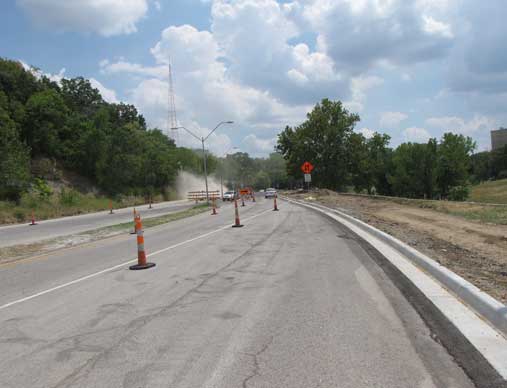
PIAC funds can go to smaller projects like curbs and traffic lights as well as to help with large projects like the in-progress improvements to Penn Valley Drive.
Never say Kansas City residents don’t have a chance to influence the budget. Each year, individuals and neighborhood representatives take turns before a city committee that hears their pleas for neighborhood improvements. After the Public Improvements Advisory Committee (PIAC) hears those requests, it makes budget recommendations that are incorporated into city spending for the following year. PIAC requests are responsible for fixing draining problems, improving community centers and parks, and building ball fields and swimming pools.
Hearings for the Fourth Council District, which includes Midtown, will be held this Thursday, July 12, and next Wednesday, July 18 (details). We asked Fourth District PIAC representative Jim McDonald what he expects from this year’s hearings.
MKCP: What should Fourth District residents and neighborhoods know about this year’s PIAC funding?
McDonald: We expect to continue to see a decrease in the amount of funding available, so competition for dollars among projects continues to be strong. Adding to this dynamic is the fact that the re-drawing of district boundaries has expanded the amount of infrastructure in the 4th district. The district now includes areas that were not a part of the district a couple of years ago: downtown, the northeast, and portions of the Northland, including Briarcliff and surrounding neighborhoods. While the 4th district has lost the southern portions of the “old” district, on balance, there are significantly more older neighborhoods and city-owned assets that will compete for funds. Therefore, it is more important that ever that proposed projects are compelling and represent neighborhood or community consensus.
MKCP: How much money is in the pool for the Fourth District this year?
McDonald: If the trend of recent years holds, we expect fewer dollars. In recent years, we have seen a cumulative decline of more than 10%. This is not only because of decreasing sales tax proceeds, but also because of increasing demands on the tax proceeds, including payment of bonds previously issued by the city, and funds needed for under-performing projects that rely on tax increments.
MKCP: Is there anything people should keep in mind if they are planning to testify at one of the Fourth District hearings?
McDonald: Keep your presentation to the point and make sure your request is specific. If you don’t know what a project will cost, that is okay—city staff will prepare a cost estimate in the fall. Visual aids can be helpful but aren’t necessary. Testimony is taken in the order that people sign in, so if you want to have your turn early in the agenda, show up early and be sure to sign in. There will be two hearings, so if you haven’t testified before and want to observe at the first meeting, you’ll get another chance with the second hearing. The hearings are very informal, and testifying doesn’t require a lot of advance preparation—just be prepared to identify the specific need in your neighborhood and your ideas about the solution to that need. Also, giving testimony is not required. You may submit a written request that will be considered, whether or not you testify at the hearing



Who’s talking